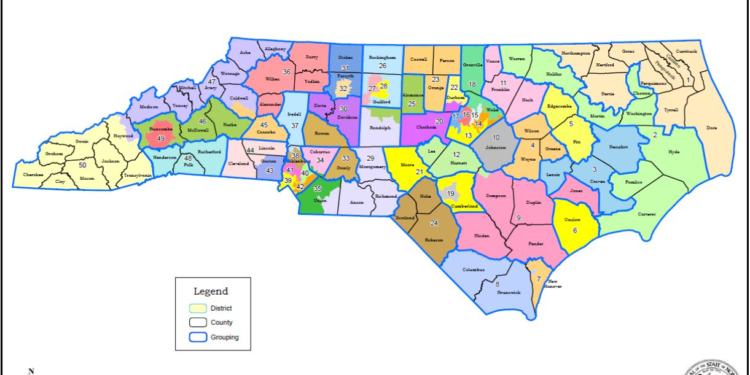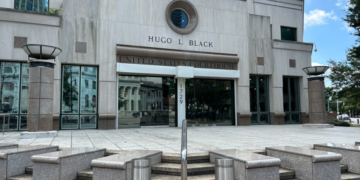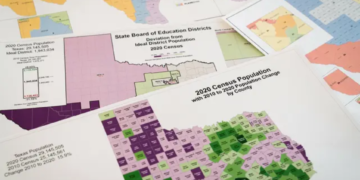Feb 11, 2025 Story by: Editor
Former U.S. Congressman G.K. Butterfield testified that his electoral performance significantly declined in predominantly white precincts compared to Black precincts during his campaigns representing northeastern North Carolina counties in Washington.
Similarly, State House Democratic leader Robert Reives recounted how campaign mail targeting him in a recent election contained both “dog whistle” and overt racial messaging.
Moses Matthews, a former Martin County school board member, asserted that a Black candidate could not win a school board district seat unless the district had a substantial Black population.
“History doesn’t show that’s possible,” Matthews stated.
A federal judge in Raleigh is now assessing whether the northeastern North Carolina state Senate districts violate federal law by diluting Black voters’ influence in counties with significant Black populations.
Matthews and newly elected Rep. Rodney Pierce of Halifax County filed a lawsuit in November 2023, challenging the Senate redistricting plan.
The lawsuit argues that Republican lawmakers intentionally configured districts in the state’s Black Belt to diminish the ability of voters in majority or near-majority Black counties to elect candidates of their choice—an alleged violation of the federal Voting Rights Act.
Ahead of the trial, Matthews and Pierce sought a court order to redraw two Senate districts in the region before the 2024 election, aiming to block the use of two districts approved by Republican legislators.
However, Federal District Judge James Dever III, a George W. Bush appointee, denied the request.
“At this stage of the case, plaintiffs fail to demonstrate legally significant racially polarized voting in northeast North Carolina in the counties at issue in this case,” Dever wrote in a January 2024 ruling. He also sided with a Republican legislative expert who argued that partisanship, rather than race, was the primary factor in voting patterns.
The Fourth Circuit Court of Appeals declined to mandate a redrawing of the districts.
The case has now returned to Judge Dever for a trial expected to span a week.
Butterfield contended that political polarization alone does not account for why Black voters in eastern North Carolina need to be in districts where they make up nearly 50% of the electorate to elect candidates who represent their interests.
African American and white voters “look at the world differently because their experiences have been different,” he testified.
During the 2021-22 session, the state Senate had 12 Black members, but that number has since dropped to 10. Meanwhile, counties in eastern North Carolina previously represented by Black Democrats are now led by white Republicans.
The state House, which had 26 Black representatives in 2021-22, now has 28.
Sen. Dan Blue of Wake County, a former Democratic Senate leader, emphasized the broader implications of racially polarized voting.
“It’s relevant when it affects the ability of minorities to elect the candidates of their choice,” Blue said.
The Democratic officials who testified Monday criticized the Republican-controlled legislature for neglecting key issues affecting Black communities in northeastern North Carolina, including healthcare, education, and environmental concerns.
Pierce explained that he challenged former Democratic Rep. Michael Wray in the House District 27 primary last year because he believed Wray was “voting against the interest of constituents.”
“Housing, education, the environment, and money for early childhood education are all relevant to us in House District 27,” Pierce stated.
The eight counties within North Carolina’s Black Belt rank among the most economically distressed in the state.
Butterfield accused the legislature of failing to address critical concerns affecting African American communities in the region.
“The legislature has been very unresponsive to issues that affect African American communities in northeastern North Carolina,” he said.
Matthews pointed to the closure of Martin County General Hospital in 2023, arguing that it could have remained open if the legislature had approved Medicaid expansion earlier.
He also noted that Black residents in some eastern counties face greater health disparities and struggle to access adequate medical care.
“What’s been happening has been detrimental to good health,” Matthews said.
The political affiliations of Black voters have shifted over time. Pierce noted that he was once an unaffiliated voter, while Blue recalled that his grandfather and his grandfather’s peers were Republicans.
The shift toward the Democratic Party became more pronounced in the 1960s, according to Blue.
“Democrats currently represent the expressed aspirations of African Americans,” he said. Source: NC Newsline

















